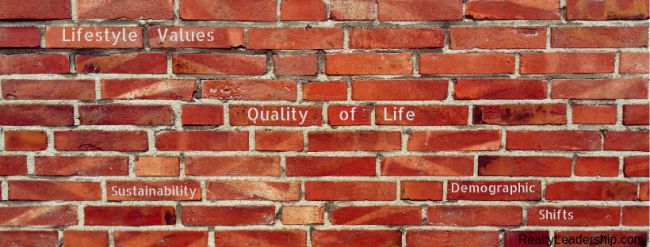As the culture changes, so will the values of homebuyers.
Real estate clients everywhere are on the hunt for the “American dream home,” with its comfort and coziness standing as the perfect accents on the annual family holiday cards. But as the American dream evolves, homes must evolve to meet the values of buyers.

This means not just amenities, but personal values as well. Helping clients visualize their criteria is just a start; agents should come into interactions with clients informed as to what these criteria may be in an evolving social climate.
Millennials and the Digital Age
The age of the internet is especially impactful when it comes to lifestyle values, the values buyers will most want their homes to support and reflect. While many potential clients are filling Pinterest boards with fanciful home ideas that may never come to fruition, digital sharing is responsible for a shift in buyer culture. For example, 76 percent of homeowners in this survey want their bonus space to reflect the intricacies, quirks, and niches of their lifestyle: yoga, for example, or art.
Millennials represent another group of future homeowners whose values have evolved from those of past generations, perhaps more rapidly than ever. One particularly striking trend is that millennials prefer quality of life to the idea of a “dream home”; in other words, they do not want to sacrifice their lifestyles in order to live in the perfect dwelling.
While this may make them seem harder to please, it can also make them easier to negotiate with. The key is being attuned to what they value about their current lifestyle, and how a new home purchase would threaten or support that. The answers to these questions can be extrapolated from their budget or by a simple conversation.
Demographic Shifts
The values of some neighborhoods in their entireties are also undergoing a shift as the population of homeowners begin to age. In many suburbs, the primary homeownership belongs to the baby boomer generation, and as they age, they will find that their neighborhoods are much less friendly to their needs. The location and commuting options may not be amenable, and as the homeowner ages, they may run into accessibility issues with their homes.
However, by the time the elderly vacate their current homes, there may not be enough next-generation homebuyers to fill them. It is important for agents to look into demographic statistics for suburban areas in order to forecast what needs it will and will not meet for future buyers.
Sustainability
Sustainability culture is also becoming a growing movement in the United States. This is especially true in commercial real estate, which is subject to many state and local laws requiring energy use data and transparency. These laws are indicative of the more environmentally aware paradigm that is overtaking the next generation of homebuyers.
Modern homebuyers, especially millennials, are increasingly interested in the sustainability options for their home. This can include anything from smart technology to the community in which the home is located; is there a recycling center nearby? A community compost? Clients may even be interested in whether neighborhood gas stations have charging ports for their electric cars.
As the culture changes, so will the values of homebuyers. By remaining apprised of shifts in culture and paradigm, agents remain on the cutting edge of buyer motivation and can give their clients the best advice possible.




 Where do we send your free Great Agent demo?
Where do we send your free Great Agent demo?





 We just need some facts about your organization:
We just need some facts about your organization:
COMMENTS